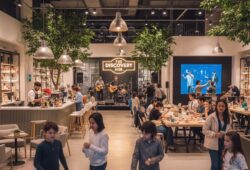Dubbed “Couch in an envelope,” IKEA‘s new project reimagines the sofa as an incredibly lightweight, modular piece of furniture that surprisingly folds flat.
Designed in collaboration with the Swiss studio Panter&Tourron, IKEA‘s sofa (which can be conveniently transported in an envelope) was brought to life with the invaluable assistance of increasingly ubiquitous artificial intelligence (AI).
The “Couch in an envelope” concept addresses the challenges of modern living, where space constraints and ease of transportation are important considerations. With this innovative design, IKEA aims to provide a solution that combines functionality, portability, and minimalistic aesthetics.
The use of AI in the development process enabled IKEA and Panter&Tourron to optimize the design, ensuring that the sofa retains its structural integrity while being compact and lightweight. AI algorithms helped analyze different materials, structures, and configurations to achieve the desired balance of comfort, durability, and portability.
By leveraging AI, Space10 and its collaborators were able to explore a wide range of design possibilities and make informed decisions. The technology facilitated rapid prototyping, allowing for iterative improvements and fine-tuning of the sofa’s design.
One of the key advantages of the “Couch in an envelope” concept is its modularity. The sofa can be easily disassembled into smaller components, making it adaptable to various living spaces and simplifying transportation. This flexibility aligns with IKEA‘s commitment to providing customizable solutions that cater to individual needs.
While the “Couch in an envelope” remains a concept at this stage, it exemplifies IKEA‘s continuous pursuit of innovative design and its willingness to push the boundaries of what is possible. The collaboration between Space10, Panter&Tourron, and the integration of AI showcases how technology can revolutionize the furniture industry, offering creative solutions for modern living.
However, it is important to note that the path from concept to commercialization involves numerous considerations, including manufacturing feasibility, cost-effectiveness, and market demand. As such, there is no guarantee that the “Couch in an envelope” will become a reality in IKEA‘s product lineup. Nonetheless, the concept serves as a testament to the brand’s commitment to exploring unconventional ideas and challenging traditional notions of furniture design.
As technology continues to evolve, it will be fascinating to see how AI and other innovations shape the future of home furnishings. The “Couch in an envelope” represents a glimpse into the possibilities that lie ahead, where intelligent design and advanced manufacturing techniques can revolutionize the way we live, work, and interact with our surroundings.










